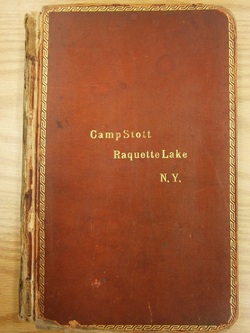 The Raquette Lake camp diary of Mr. and Mrs. Francis Stott of Stottsville-on-the Hudson, NY. 1882-1900. Property of the Adirondack Museum.
The Raquette Lake camp diary of Mr. and Mrs. Francis Stott of Stottsville-on-the Hudson, NY. 1882-1900. Property of the Adirondack Museum. This same phenomena occurred again in September 1894. One of the Stotts clipped an article and glued it to a page in the diary. The article was dayed 9/2/94 and not cited. It said in brief, ..."the sun shone red in the sky but cast no shadow. ...it was a dark day...lights were necessary in the cabins and churches even during the day and it left an uncanny feeling and fear."
The Stott's diary entry from 1894 also reveals how wide-spread the fires were. The writer says that the fine ash in the air was falling on the ladies' skirts as they rowed back to camp from church. The air, the writer states, was heavy, thick, and there was no breeze to clear it.
Indeed, forest fires were so far-reaching in the late 1800s to mid 1900s that in some instances the smoke reached New York City. I found a New York Times article (1903) titled "Forest Fires Make the City Miserable". It mentions the 'Yellow Days' that annoyed New Yorkers in 1881 and again in 1894 were causing New York City to go dark. Ships could not come into port because of lack of visibility. The cause of the yellow days were the forest fires in the Northern woods of New York (Adirondacks).
The reasons for the fires were numerous. In the spring, the slash left behind by lumber companies, and 'duff' (dead pine needles and leaf litter) built up on the forest floor and provided perfect kindling for a fire. Another cause a century ago were the steam powered locomotives traveling through the mountains. Sparks would fly from the un-screened smokestacks, landing on the forest floor along the way. The locomotives also dumped coal embers on the tracks which were easily spread by a wisp of wind and start a fire in the woods. At the time, the fine for a railroad company found not to have screens on their smokestacks was only $100.00. Hardly enough of a penalty to induce action.
The Stotts Diary includes copious notes on the weather conditions (that and the fish catch of the season) and there are quite a few references between 1882-1894 to forest fires, thick and heavy atmosphere, and hazy sky. It is interesting, when put into perspective, the irony of the situation. People were, by this time in the century, flocking to the mountains to escape the smell and stench of the thriving industrialized cities, only to arrive in the mountains and find civilization intruding once again on their pleasure.
Footnote: The Stotts brought maids with them, and always had two guides working for them in the summer. I imagine they spent a lot of time clearing the duff away from the cabins to prevent fires, much like a crew of Alumni from Cortland College did on Memorial Day weekend at the historic Antlers on Raquette Lake. Antlers was built in 1886 by Charlie Bennett, once a guide for the Durants. Antlers is now owned by Cortland College. Once a year alumni show up to help open up the camp and rake the duff away from the buildings.
 RSS Feed
RSS Feed
